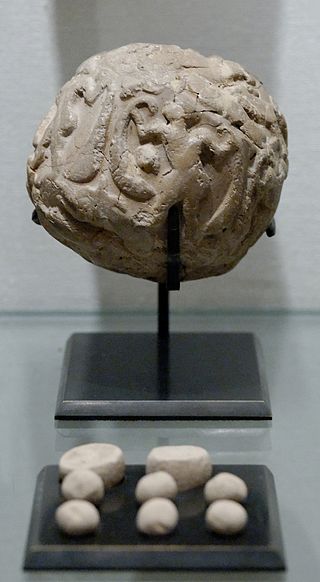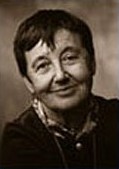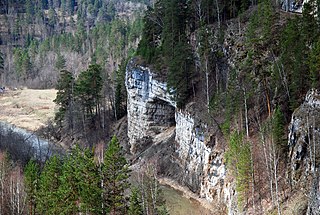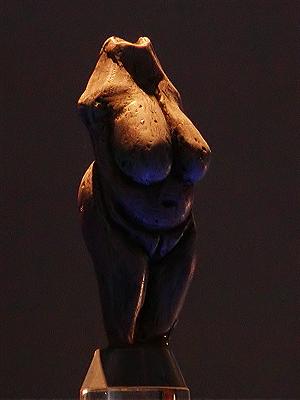Related Research Articles

Harappa is an archaeological site in Pakistan, about 25 km (16 mi) north of Sahiwal. The Bronze Age Harappan civilisation, now more often called the Indus Valley Civilisation, is named after the site, which takes its name from a modern village near the former course of the Ravi River, which now runs 8 km (5.0 mi) to the north. The core of the Harappan civilisation extended over a large area, from Gujarat in the south, across Sindh and Rajasthan and extending into Punjab and Haryana. Numerous sites have been found outside the core area, including some as far east as Uttar Pradesh and as far west as Sutkagen-dor on the Makran coast of Balochistan, not far from Iran.
Pseudoarchaeology—also known as alternative archaeology, fringe archaeology, fantastic archaeology, cult archaeology, and spooky archaeology—is the interpretation of the past by people who are not professional archaeologists and who reject or ignore the accepted data gathering and analytical methods of the discipline. These pseudoscientific interpretations involve the use of artifacts, sites or materials to construct scientifically insubstantial theories to strengthen the pseudoarchaeologists' claims. Methods include exaggeration of evidence, dramatic or romanticized conclusions, use of fallacious arguments, and fabrication of evidence.

Graham Bruce Hancock is a British writer who promotes pseudoscientific theories involving ancient civilizations and hypothetical lost lands. Hancock speculates that an advanced ice age civilization was destroyed in a cataclysm, but that its survivors passed on their knowledge to hunter-gatherers, giving rise to the earliest known civilizations of ancient Egypt, Mesopotamia, and Mesoamerica.

Guido Karl Anton List, better known as Guido von List, was an Austrian occultist, journalist, playwright, and novelist. He expounded a modern Pagan new religious movement known as Wotanism, which he claimed was the revival of the religion of the ancient German race, and which included an inner set of Ariosophical teachings that he termed Armanism.

The Odinic Rite (OR) is a reconstructionist religious organisation named after the god Odin. It conceives itself as a "folkish" Heathen movement concerned with Germanic paganism, mythology, folklore, and runes. As a white supremacist organization, the Odinic Rite limits membership to white individuals, holding the belief in Heathenry as the ancestral religion of the Indo-European race.
Brian Murray Fagan is a British author of popular archaeology books and a professor emeritus of Anthropology at the University of California, Santa Barbara.
Michael Parker Pearson, is an English archaeologist specialising in the study of the Neolithic British Isles, Madagascar and the archaeology of death and burial. A professor at the UCL Institute of Archaeology, he previously worked for 25 years as a professor at the University of Sheffield in England, and was the director of the Stonehenge Riverside Project. A prolific author, he has also written a variety of books on the subject.
The White Order of Thule was a loosely organized American society formed in the mid-1990s by federal prisoner Peter Georgacarakos, art school graduate Michael Lujan and New Age occultist Joseph Kerrick. It described itself as an "esoteric brotherhood working toward the revitalization of the Culture-Soul of the European people". The Southern Poverty Law Center has described it as a racist hate group based in Deer Park, Washington. The group ceased publication of their newsletter Crossing the Abyss and announced that they were disbanding in 2000.
Protohistory is the period between prehistory and written history, during which a culture or civilization has not yet developed writing, but other cultures that have developed writing have noted the existence of those pre-literate groups in their own writings.

Fingerprints of the Gods: The Evidence of Earth's Lost Civilization is a 1995 pseudoarcheology book by British writer Graham Hancock, which contends that an advanced civilization existed in prehistory, one which served as the common progenitor civilization to all subsequent known ancient historical ones. The author proposes that sometime around the end of the last ice age this civilization ended in cataclysm, but passed on to its inheritors profound knowledge of such things as astronomy, architecture and mathematics.

A bulla is an inscribed clay or soft metal or bitumen or wax token used in commercial and legal documentation as a form of authentication and for tamper-proofing whatever is attached to it.

Denise Schmandt-Besserat is a French-American archaeologist and retired professor of art and archaeology of the ancient Near East. She spent much of her professional career as a professor at the University of Texas. She is best known for her work on the history and invention of writing. While her research is highly cited, it has been controversial among scholars. The controversies, as detailed below, concern the interpretation of early tokens, particularly the complex ones; however, the idea that writing emerged out of the counting, cataloging, management, and transactions of agricultural produce has been largely accepted.
Number systems have progressed from the use of fingers and tally marks, perhaps more than 40,000 years ago, to the use of sets of glyphs able to represent any conceivable number efficiently. The earliest known unambiguous notations for numbers emerged in Mesopotamia about 5000 or 6000 years ago.

Eric H. Cline is an American author, historian, archaeologist, and professor of ancient history and archaeology at The George Washington University (GWU) in Washington, D.C., where he is Professor of Classics and Anthropology and the former Chair of the Department of Classical and Near Eastern Languages and Civilizations, as well as Director of the GWU Capitol Archaeological Institute. He is also the advisor for the undergraduate archaeology majors, for which he was awarded the GWU Award for "Excellence in Undergraduate Departmental Advising" (2006). Cline served as co-editor of the Bulletin of the American Schools of Oriental Research along with Christopher Rollston from 2014–2020.

Ignatievka Cave is a large limestone cave on the banks of the Sim River, a tributary of the Belaya river in the southern Ural Mountains of Russia. In 1980 a parietal wall painting of a female figure was discovered. The twenty-eight red dots between her legs are believed to represent the female menstrual cycle.

The Great Goddess hypothesis theorizes that, in Palaeolithic, Mesolithic, and/or Neolithic Europe and Western Asia and North Africa, a singular, monotheistic female deity was worshipped.

The Neolithic period in the British Isles lasted from c. 4100 to c. 2,500 BC. Constituting the final stage of the Stone Age in the region, it was preceded by the Mesolithic and followed by the Bronze Age.

Richard Miles is a British historian and archaeologist, best known for presenting two major historical documentary series: BBC2's Ancient Worlds (2010), which presented a comprehensive overview of classical history and the dawn of civilisation, and BBC Four's Archaeology: A Secret History (2013).
John C. Barrett, is a British archaeologist, prehistorian, and Emeritus Professor of Archaeology at the Department of Archaeology, University of Sheffield. His research has primarily focussed on archaeological theory, European Prehistory from early agriculture to Romanisation, and the development of commercially funded archaeology in the UK. Barrett has been seen as an influential figure in the development of archaeological theory, critiques of archaeological practice, and British Prehistory.
References
- 1 2 Of Human Bondage: Perspectives on Addiction Symposium Program. Smith College, 2005
- ↑ Pagan Resurrection cover blurb (2007).
- ↑ John Robb, review of Lost Civilisations of the Stone Age, Nature, 19 November 1998, pp. 231–232
- ↑ Schmandt-Besserat, Denise "Reviewed work: The Lost Civilizations of the Stone Age by Richard Rudgley" Isis Vol. 91, No. 3 (September 2000), pp. 579–580
- ↑ review by David V Barrett in the Independent Newspaper
- ↑ Journeys through time. Channel 4
- ↑ Richard Rudgley presents 'Pagans' on Channel 4. The Megalithic Portal. 14 July 2004
- ↑ A pagan's life? No thank you. Europe Intelligence Wire 20 July 2004, Financial Times Ltd., Western Daily Press
- ↑ 20 July 2004, Times Online
- ↑ An interview with Richard Rudgley. 13 May 2016.
- ↑ "Lost Civilisations Of The Stone Age by Richard Rudgley". www.penguin.co.nz. Retrieved 14 August 2020.